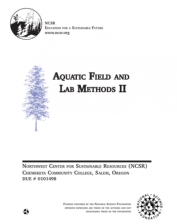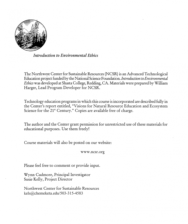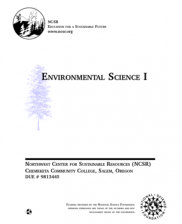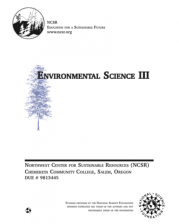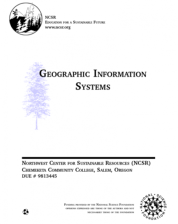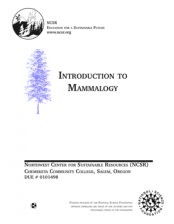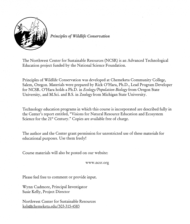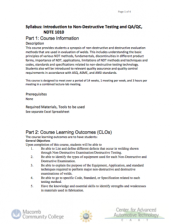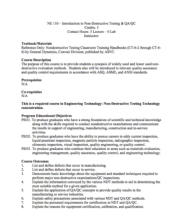Browse Resources
Instructional Material -- Course
Resources |
|---|
Course Description:
Published by the Northwest Center for Sustainable Resources, this is a capstone course for natural resources and fisheries technology programs that follows Aquatic Field and Laboratory Methods I. In the first half of the course students learn techniques for water quality...
This 61-page course guide provides an overview of the Environmental Ethics course. This course "examines human and human/non-human relationships from an extra-cultural perspective." Topics include definitions of environmental ethics, sustainability, "centrisms," "Green Politics," "Deep Ecology," "...
Program Description:
Environment Science is a series of three courses developed by Chemeketa Community College that addresses environmental topics. Each is a 4-credit course that includes a lab and lecture. The courses are targeted towards students in natural resource areas (e.g. Forestry, Fish and...
Program Description:
Environment Science is a series of three courses developed by Chemeketa Community College that addresses environmental topics. Each is a 4-credit course that includes a lab and lecture. The courses are targeted towards students in natural resource areas (e.g. Forestry, Fish and...
Program Description:
Environment Science is a series of three courses developed by Chemeketa Community College that addresses environmental topics. Each is a 4-credit course that includes a lab and lecture. The courses are targeted towards students in natural resource areas (e.g. Forestry, Fish and...
This Geographic Information Systems 3-credit course is intended to "introduce students to the principles and practice of GIS, while providing experience using ArcView and Idrisi. This course will develop both a theoretical understanding of GIS and experience in accessing GIS datasets. Students will...
Introduction to Mammalogy is a laboratory/field-based 3-credit course. The lectures introduce students to the characteristics, evolutionary history, classification, adaptations, ecology, and natural history of mammals. The labs emphasize field techniques for the the study of mammalian biodiversity...
Principles of Wildlife Conservation is an introductory course that introduces students to "the history of wildlife conservation, basic ecological concepts, human impacts on wildlife and habitat, social and economic issues relating to wildlife management, and management objectives and strategies for...
Course Description:
This Introduction to Non-Destructive Testing (NDT) course was developed by Roane State Community College and the Center for Advanced Automotive Testing (CAAT). This course is a synopsis of non-destructive and destructive evaluation methods for evaluation of welds. Students are...
Toolkit Description:
This Introduction to Non-Destructive Testing and Quality Assurance/Quality Control course is from the RCNET Comprehensive Teaching Toolkit: Quality Assurance and Quality Control, and is drawn from courses taught at Chattanooga State Community College (CSCC). These courses are...
|
| ← PreviousNext → |
